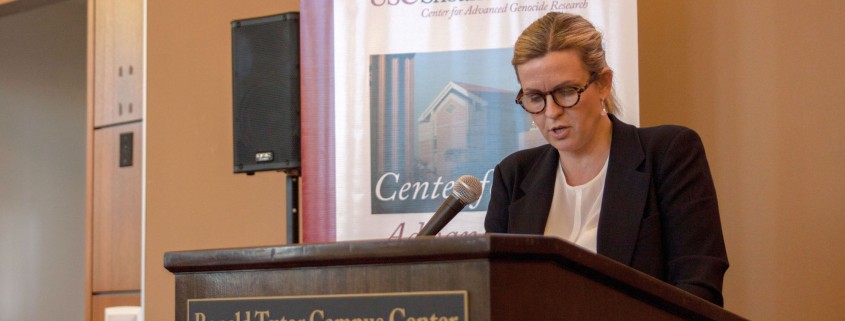Event discusses music’s impact during times of violence
To commemorate the 100th anniversary of the Armenian Genocide, the Shoah Foundation Center for Advanced Genocide Research hosted “Singing in the Lion’s Mouth: Music as Resistance to Genocide,” a two-day series of events on Saturday and Sunday that examined the role of music in resisting violence and raising awareness.
The event was put on in collaboration with the Thornton School of Music and sponsored by Visions and Voices.
Two documentaries were screened over the weekend: Screamers, which illustrates how the rock band System of a Down spread awareness about the Armenian Genocide through their music, and Following the Ninth: In the Footsteps of Beethoven’s Final Symphony, which reveals how Beethoven’s “Ode to Joy” has been used to resist 20th century dictatorships.
The screenings were held in the Ray Stark Family Theatre in the School of Cinematic Arts.
A panel featuring filmmaker Carla Garapedian was held following Screamers and a discussion with director Kerry Candaele was held after Following the Ninth.
“Music is one of the arts that is the most emotional … and it can directly affect people,” Professor Wolf Gruner, director of the Shoah Foundation, said. “People turn to music as a coping mechanism when they suffer the most extreme violence and persecution because it helps reassure [their] own mental and emotional health, connects [them] to other people and [helps them] find strength to resist mass violence.”
On the second day, speakers from the University of Cape Town in South Africa and Universitas Padjadjaran in Indonesia, as well as guests from the University of Colorado at Boulder, Columbia University and the United States Holocaust Memorial Museum discussed how music has been utilized to resist violence during the Holocaust and the Armenian and Indonesian genocides.
Following the symposium, Thornton students performed a concert in the Alfred Newman Recital Hall that featured pieces used as instruments of resistance during the Holocaust and other genocides.
“People think of [music] as entertainment, [but] we have statements from survivors who have said things like ‘music was life, music was more important than food,’” said Nick Strimple, a professor at the Thornton School and an expert on Jewish music. “It’s a very interesting concept because we don’t have a frame of reference in our own lives for what they were going through and how important the activities of daily life that we take for granted were for them.”
Twelve Thornton Chamber singers performed Pierre De Geyter and Eugene Pottier’s left-wing anthem “The Internationale,” as well as Hermann Leopoldi’s and Fritz Löhner-Beda’s “Buchenwaldlied.” These pieces were performed simultaneously much like they were in the Buchenwald concentration camp to drown out the chanting of Communist prisoners.
In an instrumental performance, Daniel Newman-Lessler, a pianist and graduate student at the Thornton School, performed “Two Polonaises,” a piece from a manuscript discovered in the Auschwitz-Birkenau camp in 1944 by an inmate.
“Music is an equal playing field. A good piece of music is big enough to fit anyone with different … life experiences,” Newman-Lessler said. “People talk about music as a universal language and one that transcends cultural barriers. I think this is very much true [because music] can convey various problems and emotions.”

